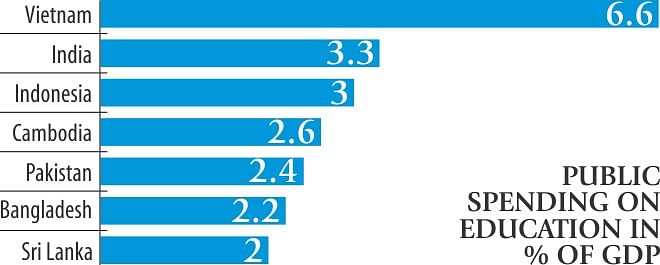Not enough yet
Not enough yet
Allocation for education rises every year, but remains far behind expectation

Although the government has increased budgetary allocations to the education sector over the years attaching top priority to it, the allocation this year is still far behind the expected level.
In terms of percentage of GDP (gross domestic product), Bangladesh spends only around 2.2 percent for education, which remained almost static for the last few years. On the other hand, countries like Vietnam and Nepal are much more ahead of Bangladesh as regards spending on education.
For education, Vietnam spends around 6.6 percent and Nepal over 4.7 percent of their GDP.
The Unesco declaration states that the allocation for education should be at least 20 percent of the national budget and six percent of the GDP.
Experts said the country's inflation continued to rise while the education sector witnessed a rapid growth with the increase in students, teachers and institutions in the last decade. But the allocation did not increase in proportion to the growth of the national budget.
Despite a positive growth in national budget, the share of the education sector as percentage of the total outlay is decreasing for the last few years.
Finance Minister AMA Muhith yesterday set aside Tk 29,213 crore for the education sector in the fiscal year 2014-15, which is 11.66 percent of the total budget. The allocation is 10.96 percent more than the revised budget of the outgoing fiscal year.
An allocation of Tk 13,673 crore was set for the primary and mass education ministry, and the rest for the education ministry.
The percentage of total allocation, however, did not match the figure five years ago. In the revised budget of the 2009-10 fiscal year, the figure was 14.3.
In the revised budget of 2010-11, the percentage was 14 which slid to 11.4 percent in 2011-12. In the 2012-13 fiscal year, the percentage stood at 11.1.
“The allocation is not sufficient even for implementing the fundamental commitments like the National Education Policy 2010 and National Skills Development Policy,” educationist Rasheda K Choudhury told The Daily Star.
The budgetary allocation for education is quite lower than those of other South Asian countries, she said, adding, “Maldives spends around 8.5 percent of its GDP on education. Even India spends over three percent.”
Bangladesh had committed to spend six percent of its GDP on education which may not be possible overnight. But it should spend at least four percent of the GDP as laid out in the national education policy, mentioned Rasheda, also the executive director of Campaign for Popular Education.
“If we continue to increase the budgetary allocation in such an ad hoc basis, we will not be able to realise our commitments,” she noted.
Education, according to experts, is a major driving force of development in any country. It has a significant role in reducing poverty in various ways, and therefore, the allocation for this sector should be hiked proportionately.